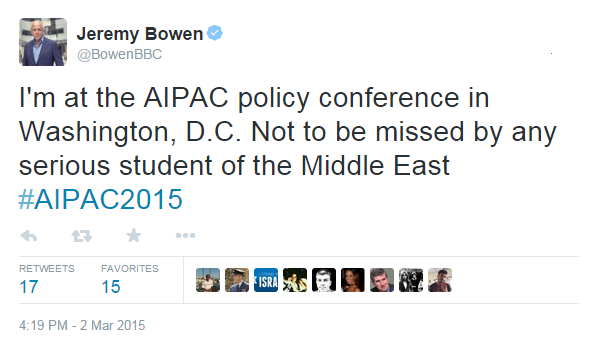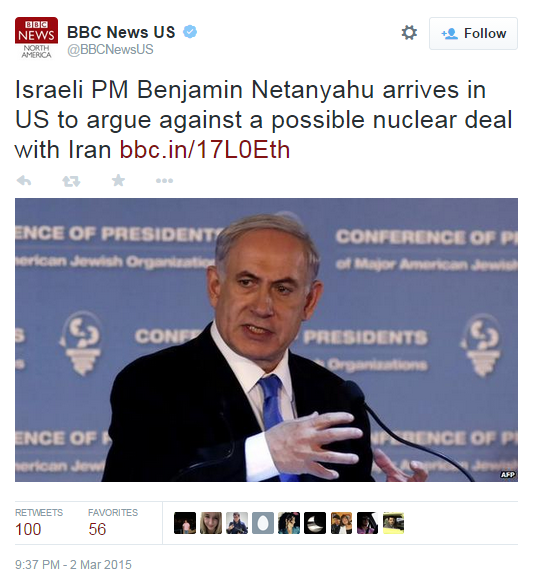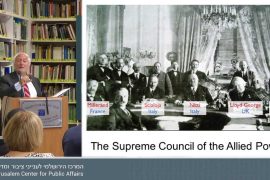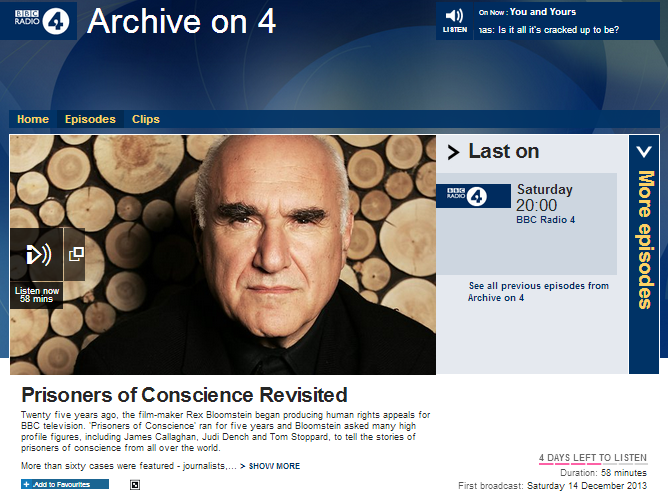Those following Jeremy Bowen on Twitter learned on March 2nd that he was in Washington.
What is particularly remarkable about the BBC Middle East editor’s second statement is that in previous years, he has not found that “not to be missed” annual event unmissable.
But of course Bowen’s real interest in this year’s AIPAC conference (and readers can find his at times snide observations of that event on his Twitter feed) actually stems from the proximity of the Israeli prime minister’s appearance there to his speech in Congress the following day and the BBC has been building up to that story for some time.
In January the BBC News website’s reporting on the invitation from the Speaker of the US House of Representatives to the Israeli prime minister to address Congress was notable for its misrepresentation of Netanyahu’s stance on the issue of the P5+1 negotiations with Iran supposedly aimed at preventing that country’s ability to develop nuclear weapons.
On February 19th the BBC News website carried a report titled “Iran nuclear talks: US accuses Israel of ‘leaks’” which for the most part was devoted to amplification of allegations made by a White House official but – in common with much of the corporation’s previous reporting on the topic – failed to comprehensively inform audiences of the concerns raised by many observers with regard to the emerging end results of the P5+1 negotiations.
On February 23rd the BBC News website promoted the Guardian/Al Jazeera story which wrongly alleged that differing appraisals of Iran’s nuclear programme by the Mossad indicated that Israel’s prime minister had deliberately misled the UN on that issue in 2012.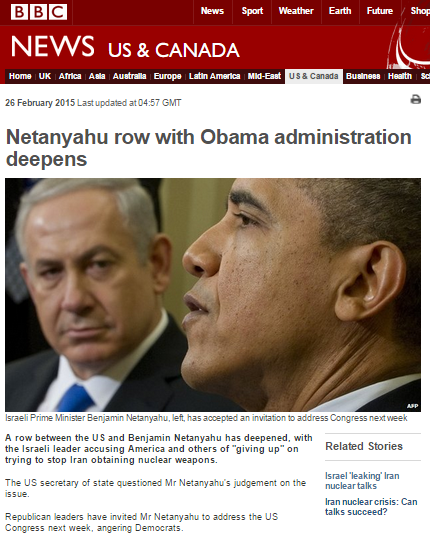
February 26th saw the appearance on the BBC News website of an article titled “Netanyahu row with Obama administration deepens” which once again was largely devoted to the amplification of US administration statements on the issue but only briefly and superficially addressed the underlying issue of concerns regarding the details of the P5+1 agreement, whilst at the same time misleadingly framing them as being confined to the Israeli prime minister alone.
On the same day, an article titled “Netanyahu ‘not correct’ on Iran nuclear talks – Kerry” also appeared on the BBC News website which further promoted the theme that concerns over the essence of the P5+1 deal with Iran are limited to Israel’s prime minister and that his presentation of the issue is based on faulty judgement.
Also on February 26th an article by Kevin Connolly appeared in the Features & Analysis section of the BBC News website’s Middle East page under the headline “Israel US: Republican invite to Netanyahu riles Obama“. Yet again concerns over what kind of deal the P5+1 is about to make with Iran were presented to readers as an ‘all-Bibi affair’.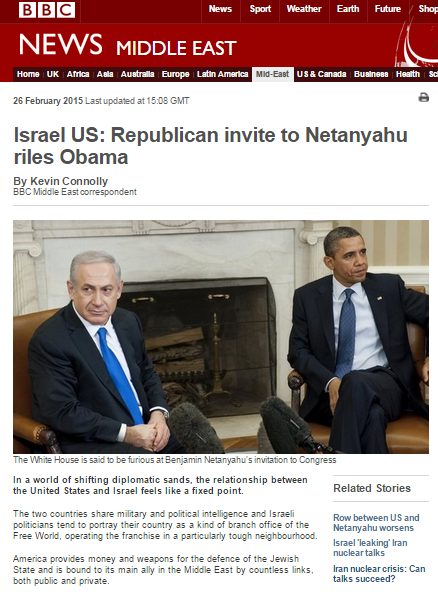
“That issue – Iran and the Bomb – is one of the defining themes of Mr Netanyahu’s career and he is alarmed that the P5+1 powers (the five permanent members of the UN Security Council – the US, Russia, China, UK and France – plus Germany) negotiating with Tehran may be preparing to agree a deal towards the end of March which would be acceptable to the world powers but unacceptable to Israel.”
All of the above, however, was merely the aperitif before the BBC really got down to business.
On March 2nd visitors to the BBC News website found another article by Kevin Connolly titled “Netanyahu Congress speech a moment of high stakes“. They could also read “Netanyahu arrives in US for contested Congress Iran speech” and “Netanyahu: Speech ‘not intended to disrespect’ Obama” or watch “Netanyahu in US on controversial visit” in which BBC audiences were , as ever, told that “Tehran denies it is seeking nuclear weapons technology”.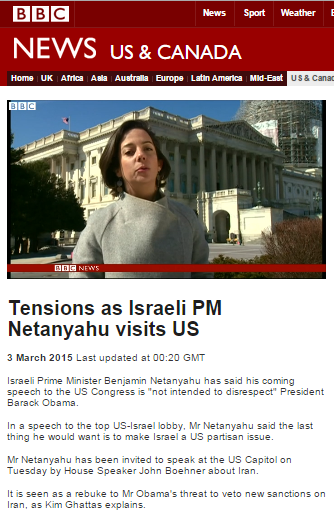
March 3rd saw the appearance on the BBC News website of an article by Jonathan Marcus titled “Netanyahu’s speech ‘win-win’ for Iran” and a filmed report (also shown on BBC television news) by upcoming J Street conference speaker Kim Ghattas titled “Tensions as Israeli PM Netanyahu visits US“. In her report Ghattas told BBC audiences that:
“He [Netanyahu] hasn’t said very much yet about the case he plans to make against a nuclear deal with Iran but this is all very much part of his strategy to try to undermine progress towards an agreement.”
That false information was similarly promoted by the BBC on Twitter.
The main course of the BBC’s Bibi binge will obviously be served up with Netanyahu’s actual speech to Congress, but as is already apparent, the information being provided to BBC audiences on this topic is both voluminous and yet at the same time misleading and lacking in crucial context.
The BBC’s framing of the story as though Netanyahu were the only party concerned about the details of the P5+1 deal is plainly both wrong and politically motivated. Plenty of other parties both in the Middle East and beyond share the same concerns and yet the BBC has refrained from reporting on that issue and on the topic of the interest shown in the upcoming Congress speech.
The claim that Netanyahu is trying to “undermine progress towards an agreement” is patently false and – as noted above – this is far from the first time that the BBC has misrepresented that issue.
Likewise, there is nothing novel about the BBC’s promotion of trite slogans such as “Tehran denies it is seeking nuclear weapons technology” with the concurrent avoidance of provision of a coherent picture of professional opinions on the issue, such as that given by the head of the IAEA on March 2nd:
“International Atomic Energy Agency head Yukiya Amano said Monday that Iran still needed to hand over key information to the UN body necessary for its investigation of the country’s nuclear program.
The two missing pieces of the puzzle relate to alleged explosive tests and other issues related to research that may also be useful for military uses of atomic energy. According to Amano the missing pieces of data should have been addressed by Iran by last August.
“The agency is not in a position to provide credible assurance about the absence of undeclared nuclear material and activities in Iran, and therefore to conclude that all nuclear material in Iran is in peaceful activities,” Amano was quoted by Reuters as saying.”
Unfortunately for members of the BBC’s funding public trying to understand why the Israeli Prime Minister is currently in Washington and what exactly is the basis for his (and others’) concerns about the P5+1 deal, the corporation’s correspondents are too heavily invested in both their own animosity towards the Israeli leader and their cheer-leading for the current US administration to get around to any real ‘standard-setting journalism’ on this topic.
Related Articles:
BBC misrepresents Israel’s stance on P5+1 talks yet again
BBC misrepresentation of Israel’s stance on Iran talks continues in Kim Ghattas report
What have BBC audiences been told about the P5+1 deal with Iran?
Does BBC coverage of the P5+1 deal with Iran adequately promote audience understanding of the issue?

